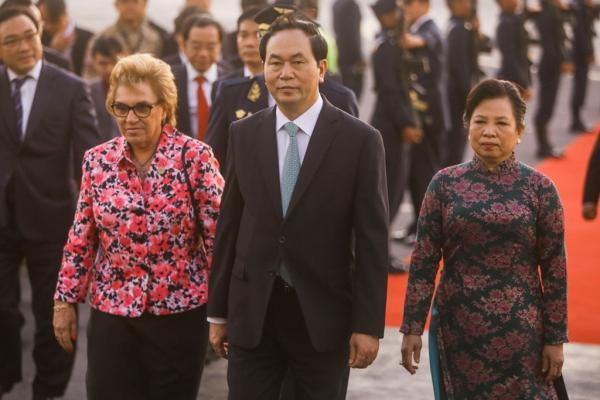VietNamNet Bridge - Vietnam should exploit opportunities from the APEC Summit to market its image as an attractive destination for investment and tourism. That was the advice of Professor John Quelch, Charles Edward Wilson Professor of Business Administration at Harvard Business School, and a leading global expert on marketing.

During his recent visit to Vietnam, Professor John Quelch talked with VietNamNet on the topic of how to help Vietnam "come late but not be a latecomer” in global economic integration.
From his perspective, Vietnam should focus its resources on investment and development.
He said that in his visit to Vietnam this year, he saw a much more bustling and energetic Vietnam than his visit last year. Vietnam is about to join the Trans-Pacific Partnership (TPP), and is preparing to host the APEC Summit 2017 next year, and Vietnam’s GDP growth is still high, especially in the big cities.
In summary, Vietnam is increasingly lively, energetic, innovative and has more and more businesses. And all are great for economic development of the country, he said.
On how Vietnam should take advantage of the APEC Summit 2017, he suggested that Vietnam should seize this opportunity to market the country's image as follows:
There are two important factors. The first is to attract investors. That shows foreign investors’ trust in the future of Vietnam market.
The APEC Summit is an opportunity driving world attention to Vietnam and it gives Vietnam the opportunity to present its enormous economic potential. Thus, the APEC Summit will create momentum to accelerate the flow of foreign investment into Vietnam.
In terms of tourism, the biggest challenge is that Vietnam has not been considered a mainstream destination and is not in the list of top priorities of the international traveler. A typical example is that a lot of people travel to Thailand, a country with highly developed tourism industry. And people traveling to Thailand want to have a second or third visit to Southeast Asia, he said. They are all very impressed with the landscapes, monuments, wonders and beaches in Vietnam.
Discussing the general strategies of APEC, the Harvard professor said that the most important thing is that the APEC members should reach an agreement on reducing tariff barriers, and strengthen cooperation to accelerate economic growth in the region. The world has increasingly recognized that Asia is the growth engine for the global economy. It will not be very long when the West and even the US will be unable to bear the heavy responsibility of the world economy.

It is essential to Asian leaders to realize that they are responsible not only for their country, for the region, but more importantly, they must recognize the responsibility to lead the world economy.
Talking about the world economy, Prof. John Quelch said that the main problem today that the world's businesses are facing is not very complicated. “All the business leaders I have talked to seemed to not be too worried about capital to increase investment expansion. The world has a lot of money and is looking for investment opportunities. Thus, capital is not the problem,” he said.
The biggest drawback for economic growth everywhere is human resources, talented and highly qualified people, especially leaders and CEOs who have the capacity to energize and boost economic growth.
And this is especially a challenge in Vietnam. Although Vietnam has a very good level of education, its per capita income is not enough to turn Vietnam into a country with a strong role in the regional economy, where profits are mainly based on low labor costs.
Therefore, education should be a top priority in Vietnam if the country wants to be more competitive, more productive, and more successful in the international arena, he said.
Bach Tuyet